The role of Faculty of Medicine in Rijeka in developing and promoting deaf culture: a few old experiences and a promising recent initiative with deaf education
Keywords:
deaf, education, Faculty of Medicine - Rijeka, CroatiaAbstract
Starting from the tradition of research and rehabilitation of hearing and speech disorders
in Croatia (SUVAG, Faculty of Education and Rehabilitation Sciences of the University of
Zagreb), this article goes on to focus on recent initiatives aiming improving the education of
deaf people at the Department of Social Sciences and Medical Humanities of the Faculty of
Medicine of the University of Rijeka.
The first traces of interest in deaf people at the Faculty of Medicine date back to the academic
year 2002/2003, when Ivan Segota (1938-2011) started an elective course entitled How to
Communicate with Deaf Patients. A round-table discussion Bioethical Aspects in Communication
with Deaf Patients was organized in 2006, and 2007 saw the start of a scientific project with
the financial support of the Croatian Ministry of Science, Education and Sports. In 2010, the
textbook The Deaf and Medical Sign Language was published. At the same time, the authorities at the Rijeka Faculty of Medicine became aware of the
long-term importance and necessity of transforming the faculty under the slogan “Faculty of
Medicine of the University of Rijeka – Friend of the Deaf”. Collaboration has started with
the American Rochester Institute of Technology, and the foundation of the National Center for
the Higher Education of the Deaf and Hearing Impaired of the Republic of Croatia has been
initiated.
Downloads
Published
Issue
Section
License
Authors who publish with this journal agree to the following terms:
- Authors retain copyright and grant the journal right of first publication with the work simultaneously licensed under a Creative Commons Attribution License that allows others to share the work with an acknowledgement of the work's authorship and initial publication in this journal.
- Authors are able to enter into separate, additional contractual arrangements for the non-exclusive distribution of the journal's published version of the work (e.g., post it to an institutional repository or publish it in a book), with an acknowledgement of its initial publication in this journal.
- Authors are permitted and encouraged to post their work online (e.g., in institutional repositories or on their website) prior to and during the submission process, as it can lead to productive exchanges, as well as earlier and greater citation of published work (See The Effect of Open Access).



